
Forest View High School
TE KURA O TE WAO NUI Ā TĀNE
Learning at FVHS
Learning at Forest View High School and Timetable Structure
We are proud of the way we have reimagined our timetable and use the time within a week to challenge students to learn in multiple ways and to have a champion who mentors them.
We have broken our week up into 1500 minutes, into blocks of 300 minutes per day. We have 100 minute learning sessions each day in the morning prior to Interval and then on all days except Wednesday another 100 minute lesson before lunch. After lunch there are two 50 minute learning sessions prior to the end of the day. 100 minute sessions may seem like they are a long time but with teachers differentiating their lessons and breaking the lessons into various activities etc these are the most preferred length of time for teaching. The longer times are really helpful for all of our practical based subjects e.g Workshop subjects, Art etc.
Our Senior students choose five subjects and they have 200 minutes per subject. This is more than enough subjects to gain NCEA, endorsements and University Entrance through Approved subjects. Each subject provides the ability for students to gain a subject endorsement should they choose this for both semesters. This is on top of Arataki and Akoranga. Both Arataki and Akoranga are learning times - they are just not subject specific learning times e.g. Maths, English. Students are able to gain credits through the learning that takes place in both Akoranga and Arataki . No subjects are compulsory for students to choose in Year 11, 12 or 13. The subjects chosen should be based on possible future career pathways. If these are not known as would often be the case in Year 11 a broad programme of study would be encouraged. If students are clear about their future pathways as they should be more so at Year 13 then more specific subjects should be chosen to meet the career needs e.g. to be accepted into Medical School you would generally need to take all of the Sciences Senior students are also able to change their subjects over at the end of the semester. This would be ideal for someone who does not want to sit externals in a subject or who wants to try a new subject for the second part of the year. The Kaitiaki and Arataki teachers talk through career pathways before the new subjects are selected for the second semester. Parents / caregivers / whanau are always welcome to be part of these discussions.
Junior students have 7 subjects which each run for 150 minutes per week. This is to allow them to experience a wider range of subjects so they understand what each is about before specialising more in the senior years. All Junior students also have Arataki and Akoranga each week as well as a period dedicated to their Junior Certificate of Learning. This session will enable them to work on the community, movement and Literacy and Numeracy parts of their JCL. Further information will be provided to students at the beginning of 2022 about how this session works. Junior students are all placed in a mixed ability core class where the teachers will differentiate the learning to meet the needs of all students.
Junior Students have two option lines where they will complete rotations of subjects. One of these is compulsory and contains Languages (Samoan, Te Reo Maori and Cook Island Maori) Te Ao Maori and Drama. The other one contains Digital Technology, Materials Technology, Art, Music and Food and students choose which options they would like to take. The rationale behind these option lines is that by the time students get to high school they will already have tried the optional subjects in technology classes or as part of their general classroom education. Specific language learning and drama classes are not usually able to be taught before high school so these are compulsory.
We are delighted to provide students with a wide range of taught subjects including Physics, Statistics, Chemistry as well as Outdoor Education through to Languages. For a small school this is something we have strived to ensure we can continue to offer. If there is a subject that cannot fit into the timetable or cannot be staffed for some reason we offer this through Te Kura where students have a teacher from outside our school teaching this subject to them.
Below are the subject lines and how the week works for students. Junior students will be in a core class and will follow around their class.
Option lines for Year 9 are in the following lines: Languages / Te Ao Maori / Drama (Line 2), Arts/Technology (students can choose) (Line 4).
Option lines for Year 10 are in the following lines: Languages / Te Ao Maori / Drama (Line 1), Arts/ Technology (students can choose) (Line 5).
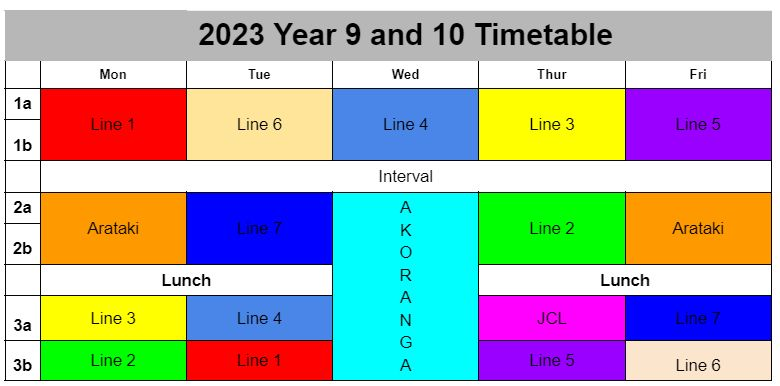
Junior Certificate of Learning
At the beginning of 2021 we introduced a Junior Certificate of Learning for all Year 9 and 10 Students. Credits are gained across all your subjects to gain an Achieved, Merit and Excellence Certificate. There will also be a further range of awards on offer on top of this which your Arataki teacher will help you apply for which include contribution to community, sports and cultural activities participation. This further tier will allow you to gain Bronze, Silver and Gold Junior Certificate of Learning awards.
Arataki teachers will provide more detailed information to explain how this works across all your classes.
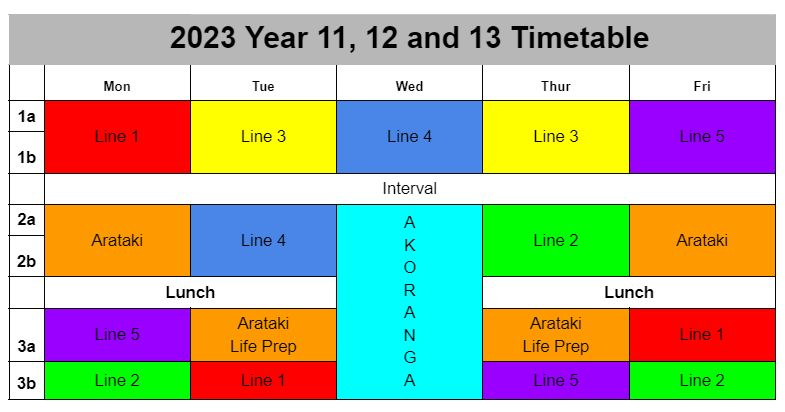
Senior Students have course confirmation days on the 1st , 2nd and 3rd of February where they need to confirm their classes for the year. There have been some changes since they made their first selections. Year 13 will complete their course confirmation at their Year 13 Induction day on the 1st of February. All Year 13 students need to attend this too!
Course confirmation will take place in the Student Hub with Kaitiaki and Jason Jowett. No appointments are necessary please just turn up between 9am and 3pm to complete this. If classes are capped to certain numbers these will be given to students who confirm first.
Senior Students will not be able to start classes until their timetables are confirmed. These are our Semester 1 confirmed lines.
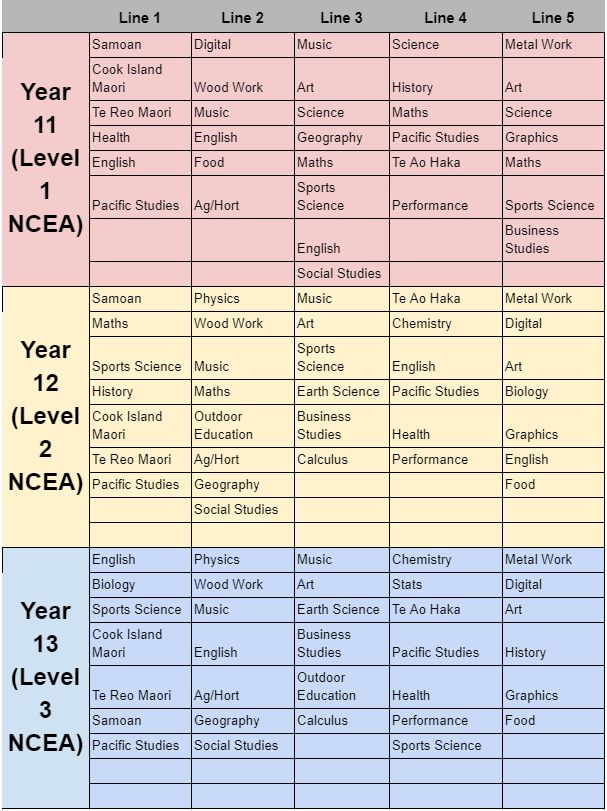
NCEA:
NCEA is the formal qualification system we operate under. It is currently under review but no changes will take place until 2022 so for next year it is business as usual. We however are revising the way we think about NCEA. In order to gain NCEA at each level you require the following:
NCEA Level 1 |
| Requires 10 Literacy credits and 10 Numeracy credits plus 60 credits at Level 1 or above | |
NCEA Level 2 |
| Requires 60 credits at Level 2 or above | |
NCEA Level 3 |
| Requires 60 credits at Level 3 or above | |
Over the years students have amassed significantly more credits than they have required to gain their qualifications. From 2020 reduced the number of credits on offer to our students so they are able to focus on the learning for their subjects rather than credit accumulation. Students are under significant stress during their NCEA years and we want to reduce the stress students feel from over assessment. A higher number of credits does not give you a better quality of qualification, achieving to a higher level e.g. Merit and Excellence level gives you a better quality of qualification.
If students are planning on attending University or want this as an option there will be plans in place to ensure they gain University Entrance Literacy and University Entrance (3 approved subjects with 14 credits or more).
Semesters: From 2023 we will run two semesters where the courses taught in each semester will be required to be standalone. Semesters allow students to choose up to 10 different courses in a year and also has the added advantage of ensuring their achievement is added during the year removing some of the last minute pressure.
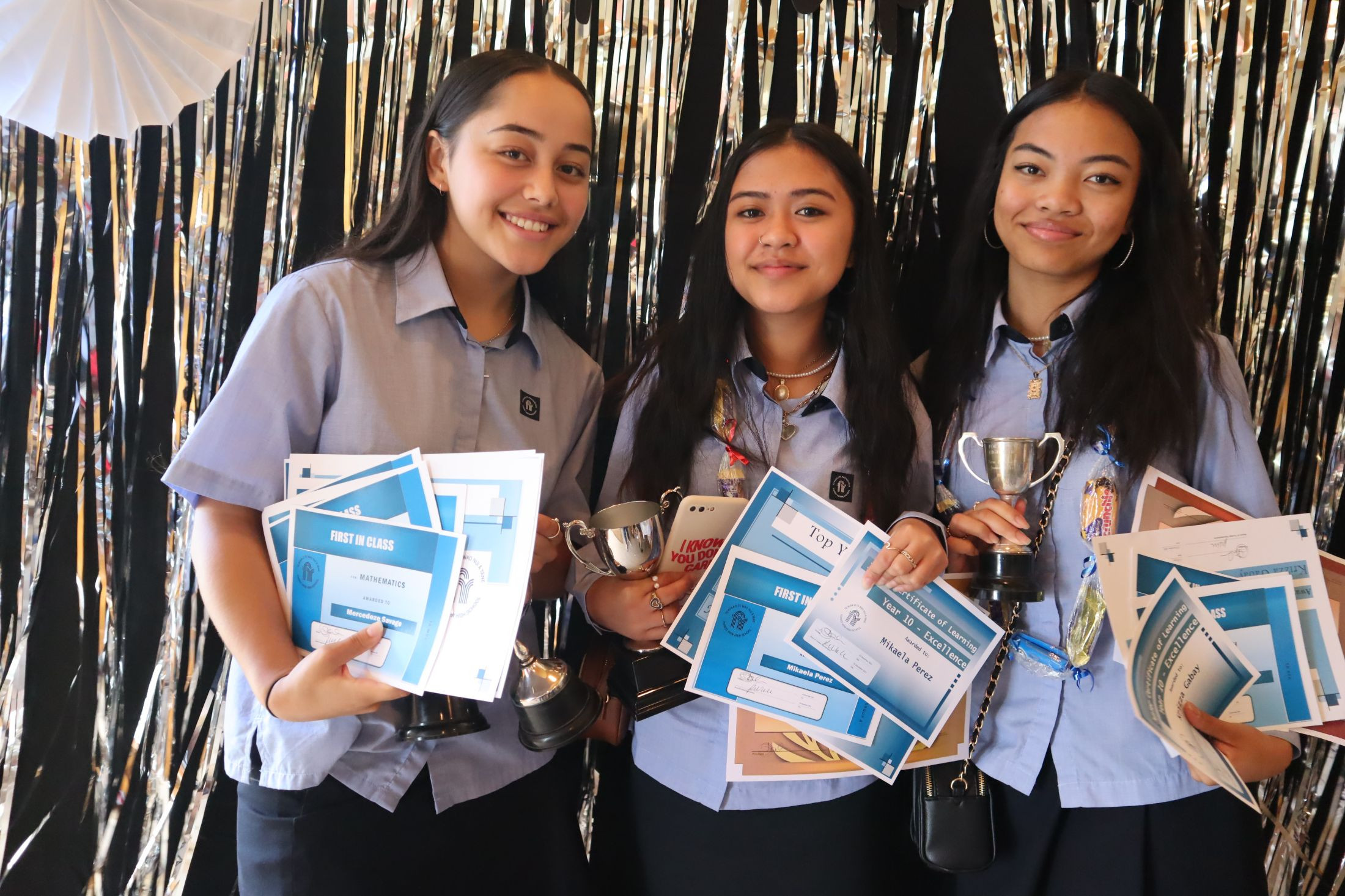
What is Akoranga?
Akoranga occurs most Wednesday of the year from 11am to 3pm. This is a combined learning time where students from Year 9 to 13 are able to choose an option they are interested in. This allows for a Tuakana-Teina model of learning where students from all Year levels can mix together and learn together. It may be the older students teaching the younger or the younger teaching the older.
The time is a structured learning time with a clear plan of the programme and expected outcomes at the end of the time period. In 2022 we will introduce some showcases of the learning that has taken place - we will invite in parents / caregivers and whanau to view these.
We have made some changes to Akoranga for 2023 including the following (thank you for all the feedback we received):
A set list of Akoranga options that will change to reflect student interest.
Students will now choose a new Akoranga subject every Term instead of this being run for a Semester.
Some of the offerings in the past cannot be run unless they have a final product at the end of them e.g. Gaming must now include some form of measurement to show progress e.g. Building of a Minecraft city etc
Akoranga will be included in our reporting to families.
Akoranga is an opportunity for students to try out new things and to not be under pressure with gaining credits from this subject. If achievement naturally falls out of the learning then students will be awarded with this, if not there are other goals that can be set e.g. for the Walking / Tramping group it could be the students are able to walk more difficult pathways than at the beginning of the term and have increased their fitness levels.
We are always looking for a mixture of student interest and staff being able to offer suitable programmes for Akoranga. Food is a great example here where a student may not take this subject as it does not fit into their career plan but they have a passion for cooking. This allows them in their week to still be able to complete some learning in this area. Study is always an option for senior students.
During 2023 we will use Wednesday Akoranga time for Lake activities and a range of other activities we usually engage in to avoid other class interruptions.
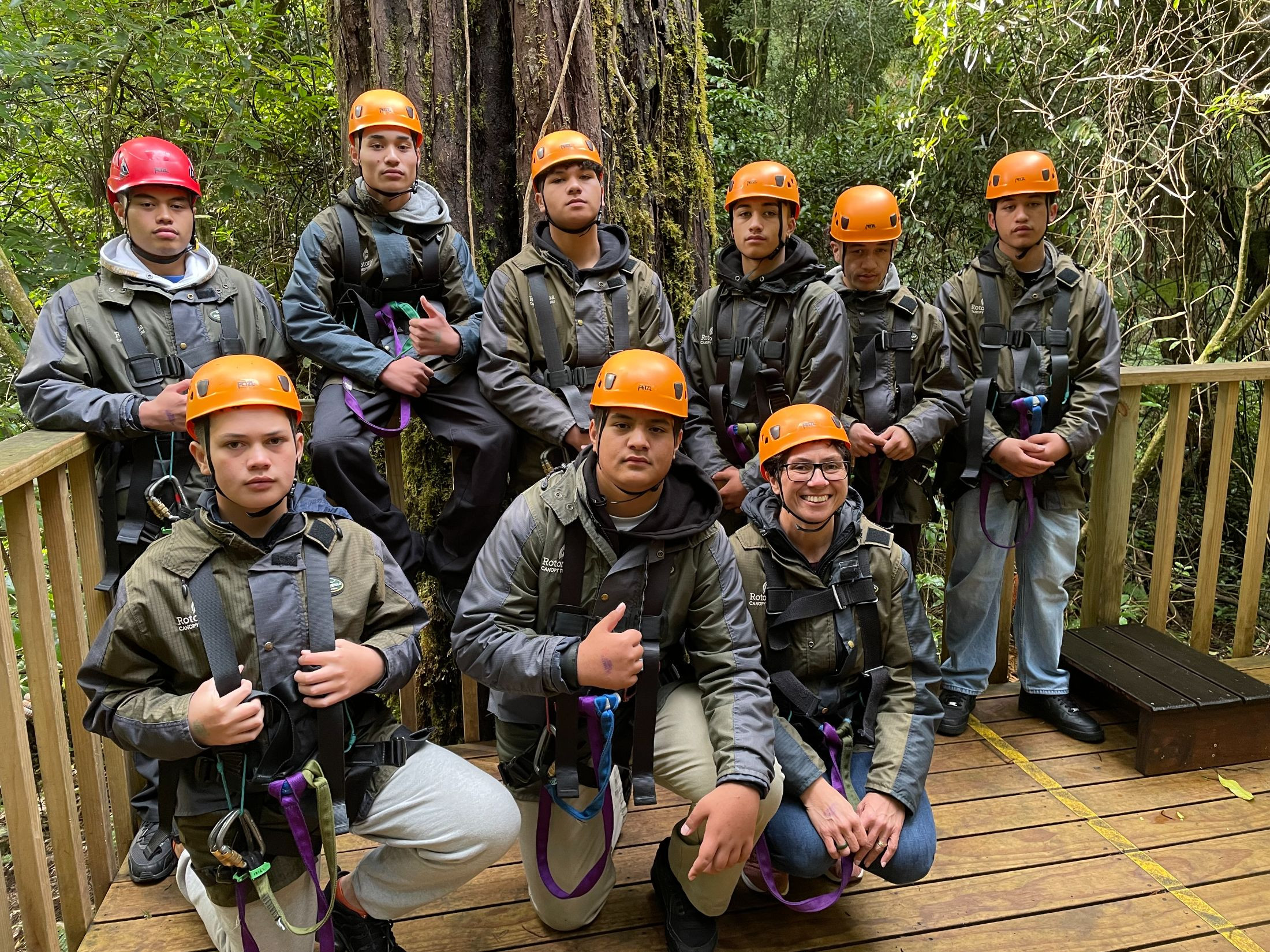
What is Arataki?
The key concept behind Arataki is to ensure that all of our students belong to the Forest View High School community, they are connected to a person who is their champion in all aspects of school life. This happens through having key people in the school who care for you, know you and celebrate your successes. Likewise they will also let you know when you need to be better and together you set goals to achieve for the year.
Arataki is part of the holistic well being of our young people. We have a responsibility to ensure that when our students leave us they are not only educated (have gained as many qualifications as possible) but they have the soft skills required to be successful in life. These skills include understanding how to run their personal finances, how to navigate the world of drugs and alcohol, how to work alongside other to achieve a team goal, how to make phone calls, have a bank account and IRD number, understand how tax works and also know how to access help from the services in the community. All of these skills are taught in Arataki.
Arataki is split into two blocks of 100 minutes for Seniors and Juniors with their Arataki teacher who know the students the most. This enables them to not only provide the above life skills but to check in on them to ensure there are no pastoral issues to follow up. All students use MyMahi a computer based programme for tracking the mentoring and goal setting. This also holds their student ID and can move through all year levels and after school with students with all of their information on it including a CV and other useful employment related information.
The days of running a tutor time for students to check the roll and read out notices is relating back to an old out of date education system. Students are more than this these days and the world we are preparing them for and already living in is very different to the one where we would have maybe seen students for 10 minutes a day and maybe knew them or simply knew their name. Students are needing much more connection now as they enter a disconnected electronic world. Many students struggle to relate to others face to face, are petrified of making a phone call or asking someone a question face to face. Arataki class is where we can address some of these issues and always push students to be braver than they think they can be. While the overall concept of Arataki may be a different or new one to you, be assured it is learning time and it is important for teenagers to have this time allocated to them. We carefully track the time used in Arataki and there is a group of Year Level Kaitikai and Jason Jowett who plan and monitor the time in Arataki and how it is used.
Each Arataki class is year level specific and lake based e.g. 11 Whakamaru, 12 Arapuni etc. Arataki time is also used for Lake assemblies, Year level assemblies, whole school assemblies, guest speakers, Tertiary providers to visit. Using Arataki as the time for all of these events avoids us interrupting the core classes for students.
Arataki teachers are your main and first contact with the school and they will be in touch with you regularly.
Our Place
- Learning at FVHS
- Lakes

